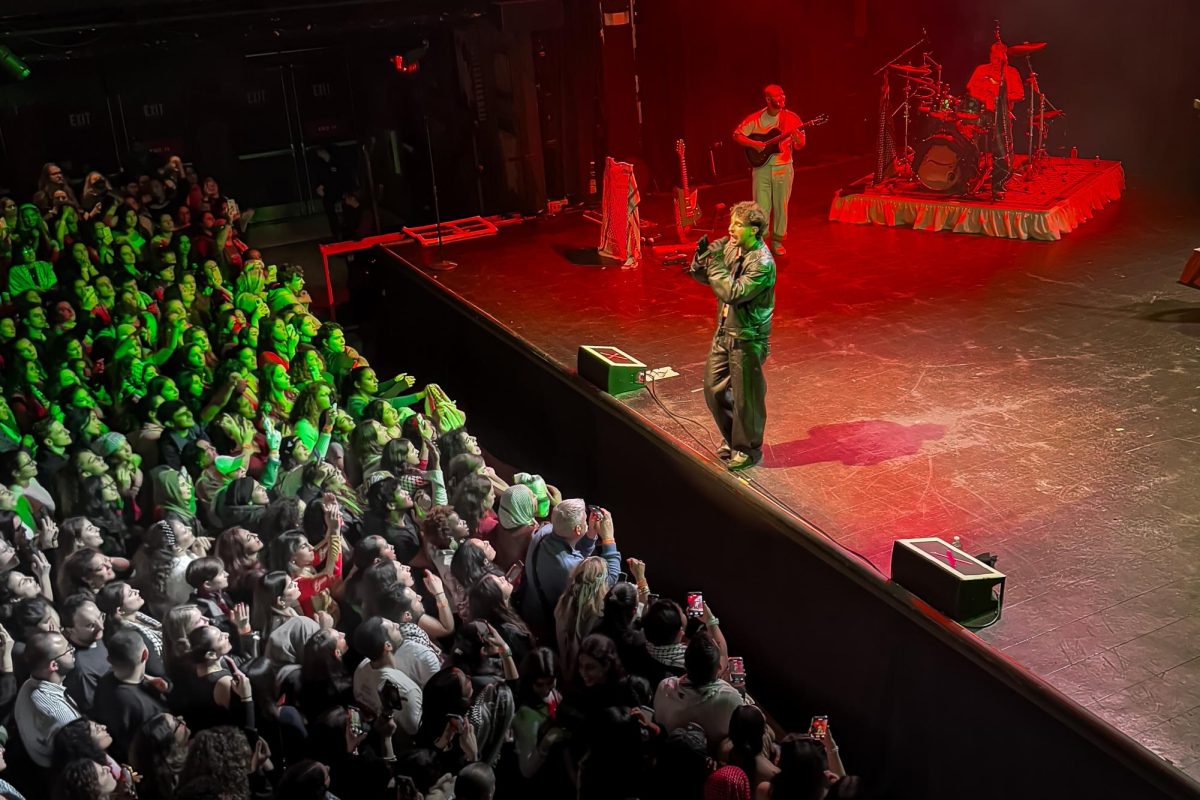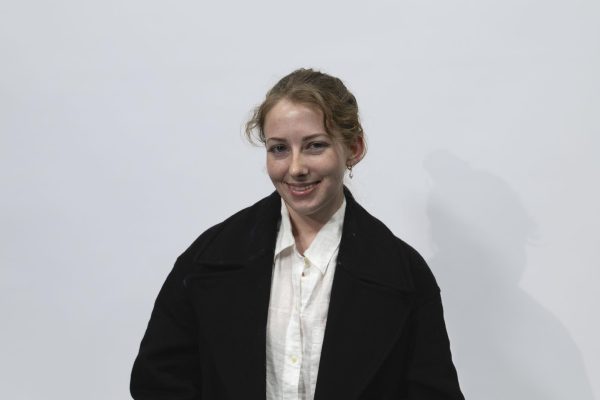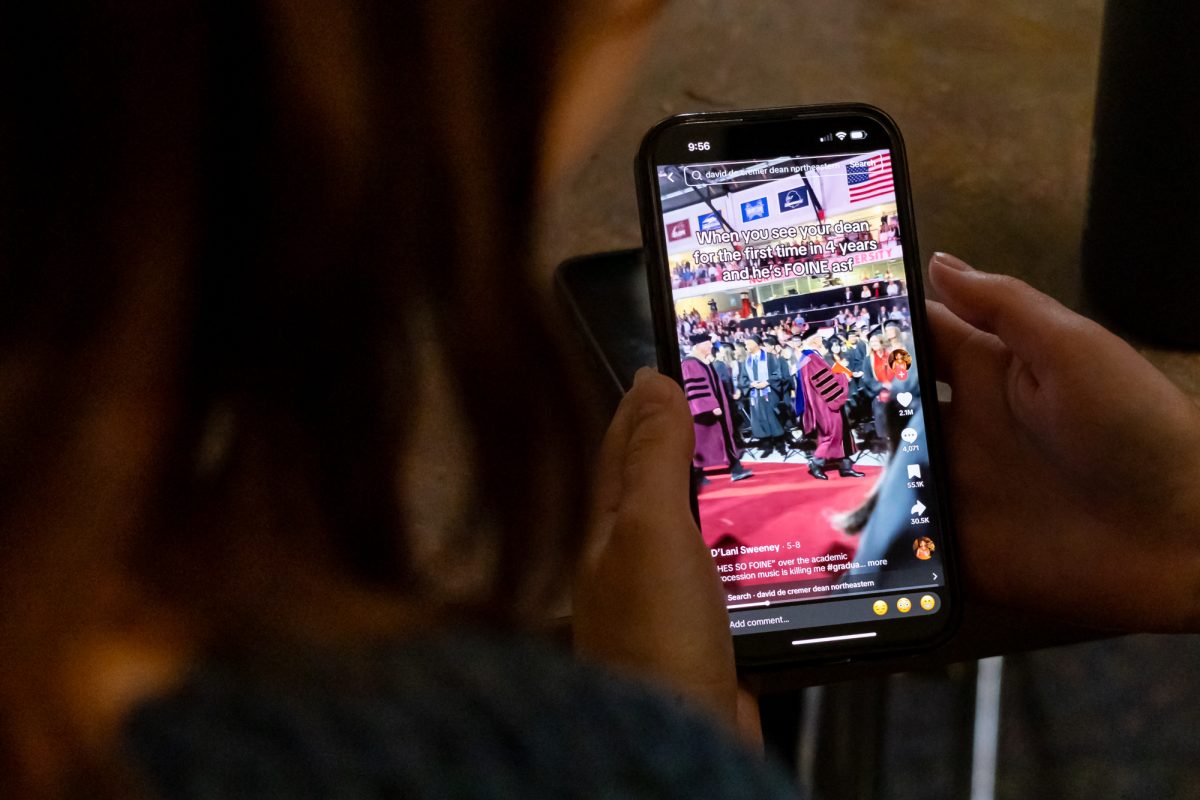The crowd at Boston’s Citizens House of Blues was in high spirits last month for one of the final stops on Palestinian musical artist Saint Levant’s “Deira” tour promoting his recently released album of the same name. Both Saint Levant, born Marwan Abdelhamid, and his special guest Lina Makoul were raised in Palestine, and support for Palestinian liberation and an end to Israeli occupation was clear from the abundance of audience members wearing Palestinian keffiyehs and waving flags.
Makoul’s powerful opening set Dec. 11 involved speeches about censorship of Palestinian voices with music as a form of resistance and her experience becoming a completely independent artist based in Palestine. In between, she performed her recent single “on mute” as well as her earlier songs including “Fish Masari” and “Shway Shway” before giving the stage to Saint Levant.
Saint Levant opened with “On This Land,” a stirring, haunting expression of his Palestinian identity packed with references to poetry and slogans from his homeland. It’s the first track on new album “Deira,” which takes its name from the Al-Deira Hotel in Gaza, where Saint Levant spent his childhood. The hotel, which foreign journalists frequented while covering Gaza, has since been destroyed by Israeli attacks within the past year. In “Deira,” Saint Levant touches on experiences ranging from a childhood in which he felt out of place to the complex feelings attached to his worldwide fame as a rapper and singer.
“Like I say in my song ‘Comme C’est Beau’… I used to dream of traveling the world and singing to the world,” Saint Levant said. “And Boston, look at us now.”
“Comme C’est Beau,” the second song of Saint Levant’s set, was one of many in which he performed in three separate languages: Arabic, French and English. His multilingual performances are a product of his Algerian and Palestinian upbringing. This is highlighted in “5am in Paris,” in which he sings, “Mon corps à Paris, mon coeur à Gaza, mon âme à Algiers,” meaning “My body in Paris, my heart in Gaza, my soul in Algiers.”
After performing “5am in Paris,” Saint Levant discussed his childhood dreams of being a famous rapper despite the disapproval from his community. The same peers who once ridiculed him for his painted nails and unique fashion sense now consider themselves his fans, Saint Levant said.
“I had a dream when I was a kid. I come from a society that’s a bit judgemental, and I was a bit scared of what other people were gonna say if I tried to actually pursue this dream of making music,” Saint Levant said. “Sometimes I sit at home … and think about what would have happened if I had listened to the people that used to hate on my nails.”
He then transitioned into the aptly named “Nails,” which celebrates his success story, followed by “Forgive Me,” which explores the balance among the blessings of fame, the hard work it took to earn it and the humility he still holds on to as he looks to his homeland.
Following “Forgive Me” was the unreleased “Wazira,” the title of which refers to a female minister of an Arab regional or national government. “Wazira” discusses a powerful woman whom Saint Levant values highly — a theme shared by the next track “Let Her Go,” which praises the love of his life with an upbeat number.
Saint Levant then calmed the mood for “Facetime,” a track from his 2023 EP “From Gaza, With Love,” which explores his deep connection and admiration for the woman he loves and his desires for their future even when there are great distances between them. The mood mellowed out even more for “Very Few Friends,” the song that put Saint Levant on the map when the teaser went viral on TikTok in 2022, tripling his following on the app over two months.
During instrumental breaks in “Very Few Friends,” Saint Levant traded his handheld microphone for a saxophone, highlighting jazz and R&B among his diverse mix of genres. Reggae was also thrown in the mix as Alexandre Bamba, Saint Levant’s bassist, sang in the style during “Very Few Friends,” breaking the string of love songs to discuss the strength of Palestinian people. The unrequited love song “Galbi” followed, after which Saint Levant spoke on a heavier note.
“I think I speak for all of us when I say it’s been an extremely tough year. Not just for us Palestinians, for everyone in the Arab world and everyone in all oppressed nations across the world,” Saint Levant said, gesturing to the various flags audience members hung from the mezzanine.
Palestinian and Algerian flags were most prominently featured, but the Syrian flag joined them as a bold reminder of the fall of Bashar al-Assad’s regime in the nation just three days prior to the concert. Saint Levant also did not back away from discussing unfair portrayal of Arabs and their experiences by American media.
“When I talk about language and dehumanization, what I’m talking about is 100 years of American media portraying us as either this pack of Arabs that don’t have any names or the Arabs that have 17 wives,” Saint Levant said. “They don’t know how beautiful Syria is. They don’t know how beautiful Lebanon is. Yemen. Oman. Bahrain. Qatar….They don’t know how beautiful our culture is and how deep it is.”
Saint Levant also touched on the survivor’s guilt he feels as fellow Palestinians struggle to survive amidst Israeli attacks and the humanitarian crisis in Gaza.
“I’m on a stage, and my brothers and sisters at home don’t even have a tent. It’s been a year, they’re moving, they don’t have their clothes,” Saint Levant said. “But my mother always tells me one thing whenever I’m down. She tells me, ‘Marwan, your existence tonight here, is resistance, subhanallah.’ And your existence here tonight is resistance because nothing scares them more than 2,000 people that have the same morals and values all in one room.”
This sense of pride, defiance and community inspired Saint Levant to write his latest single “DALOONA,” which is an energetic celebration of his Palestinian heritage. In an emotional shift, Makoul joined him on stage during “From Gaza, With Love,” a solemn ballad to his homeland. Makoul’s haunting vocals and emotive movements recalled the song with which she opened the show: “on mute,” a lyricless expression of passion and pain. Saint Levant finished with “Allah Yihmeeki” and the album’s title track “Deira,” which is heavily inspired by traditional Palestinian music and discusses the deeply permanent importance of his roots.
As voices of audience members singing along to Mohammed Assaf’s “Dammi Falastini” filled the venue after the show, there was a sense of tremendous pride in a nation over 5,000 miles away. At the center of the floor, a handful of attendees danced a traditional Levantine dabkeh. Not everyone understood the song’s Arabic lyrics, but it was impossible to miss the meaning Saint Levant and Makoul conveyed through every song, dance and speech: No matter where Palestinians and their supporters are, they will not be silenced and not only their music, but their very existence, is resistance.











